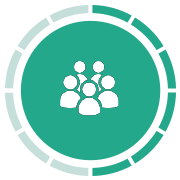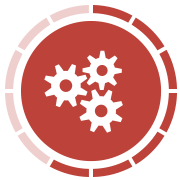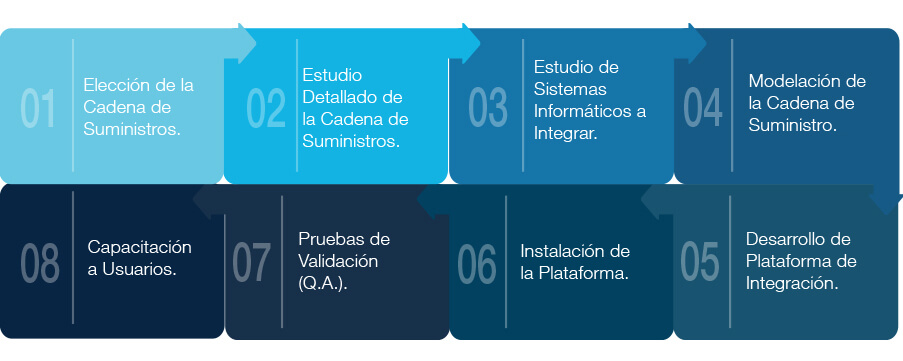Essential Pieces

Those who give life to our Supply Chain. They have the responsibility to see that the ecosystem formed by the strategic objectives, people, teams, and performance standards functions better each time.
Provide tools so that they can comply with the following functions:
• Realize fluid communication among the distinct parts of the Supply Chain through “chat” and email.
•Identify the owners and work teams involved in each process and service generated in the Supply Chain.
•To be automatically notified by blue-loop when any stage of the Supply Chain presents deviation in its performance.
•Access important Supply Chain information from a mobile device such as a Smartphone or Tablet.
 This is a digital entity utilized to virtualize a specific stage or process in the Supply Chain, thus representing critical performance parameters which can cause a negative impact throughout the work flow and, as such, signify a risk in providing a good or service to a client. The Nodes, also called Building Blocks, are found organized by category and type of operation within the Supply Chain, allowing the user an easy identification and interpretation of the process flow which he is in charge of.
This is a digital entity utilized to virtualize a specific stage or process in the Supply Chain, thus representing critical performance parameters which can cause a negative impact throughout the work flow and, as such, signify a risk in providing a good or service to a client. The Nodes, also called Building Blocks, are found organized by category and type of operation within the Supply Chain, allowing the user an easy identification and interpretation of the process flow which he is in charge of.
The following organization corresponds to category:
• Stock or Inventory: Corresponds to all the Supply Chain stages related to the temporary warehousing of inventories, such as: products, raw materials, packing material, processing material, requests in process and safety inventories. All of these used to opportunely supply a product or service.
• Flow: In this classification are found those stages of the Supply Chain which are responsible for the efficient transportation from one point to another, assuring a correct delivery of inventories, as well as a product or service to the final client of the organization.
• Cadena o “Loop”: mediante esta clasificación se agrupa las actividades o etapas de la Cadena de suministro que están involucradas en la entrega de un bien o servicio desde su origen hasta su entrega final.
Within each Building Block the users of the system can obtain valuable information in real time about the behavior and performance in each stage of the Supply Chain. This information can be organized in the following way so that it can be analyzed in a systematic way by middle and senior management:•Productivity • Tasa de utilización de recursos. • Utilization Rate • Measure specific quality attributes • Measure financial reasons directly related to the operation • Record of incidents presented in each stage of the Supply Chain • Measurement of delivery time or client response • Balancing of work loads • Analysis of risks associated with a possible delay in the work flow
 Centralizes users and Building Blocks with the goal of being able to visualize the complete form of the Supply Chain which is in charge of providing a good or service. Through this it can identify the distinct opportunities for improvement which add value and reduce the response time to the client.
• Allows visualizing the behavior and performance among the intermediate activities of the Supply Chain (transportation, transformation, inspection, and warehousing) in such a way to achieve identification of bottlenecks and limitations in the entire work flow.
Centralizes users and Building Blocks with the goal of being able to visualize the complete form of the Supply Chain which is in charge of providing a good or service. Through this it can identify the distinct opportunities for improvement which add value and reduce the response time to the client.
• Allows visualizing the behavior and performance among the intermediate activities of the Supply Chain (transportation, transformation, inspection, and warehousing) in such a way to achieve identification of bottlenecks and limitations in the entire work flow.
• To identify beforehand client requests which may be delivered late to clients.
• Measure and assess the speed of the work flow which is present in the Supply Chain.
• Register and maintain through time information related with performance fulfillment.

Is the communication piece between blue-loop and “ERP” systems – Enterprise Resource Planning – present in each organization.
Integration Methods: Blue-loop can integrate and communicate with ERP systems in any of the following ways:
1. FTP – “File Transfer Protocol”: Information systems allow reports to be issued in files with the domain “.csv” or “.xlsx,” to place them in a shared file where they are absorbed by blue-loop.
2.Web Service “WS”: A communication channel is developed among web applications which allows the actual system to send the information to blue-loop.
3.Manual: Blue-loop allows the users to upload information manually. This can be uploading a file type “.csv” or “.xlsx”, as well as directly in the application.


